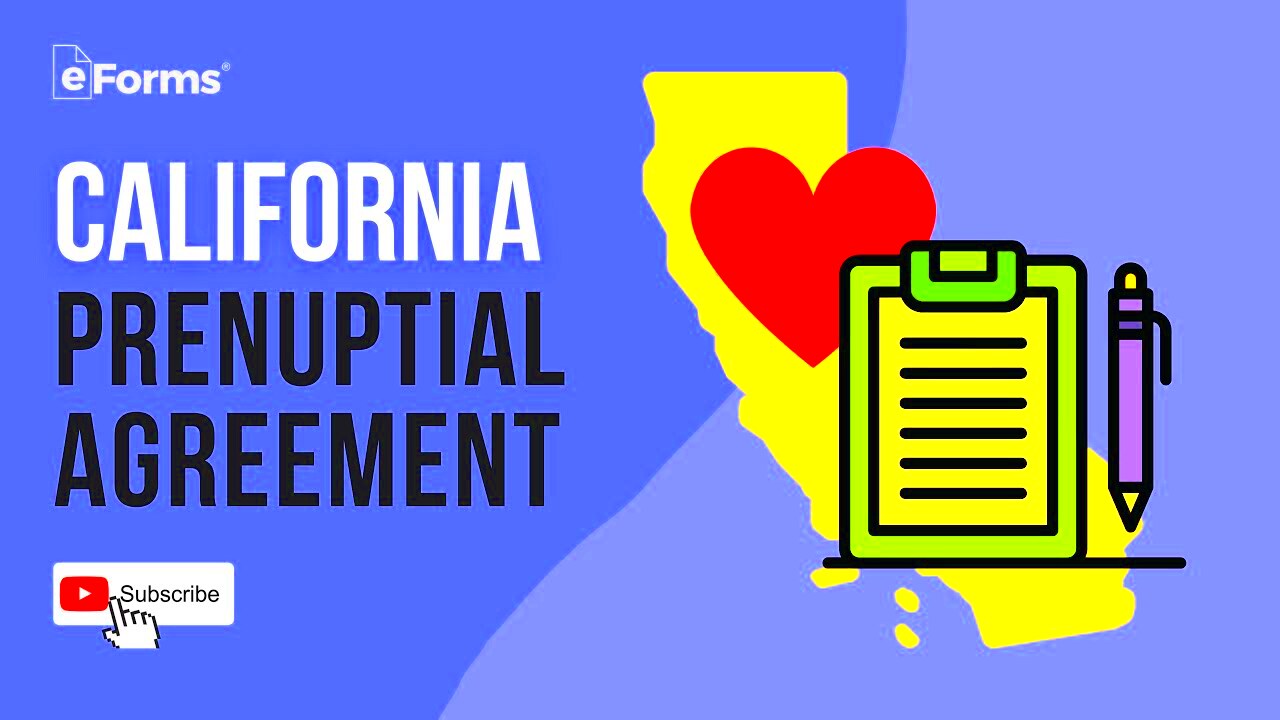California Prenup Laws and Legal Considerations for Couples
Prenuptial agreements, often called prenups, are legal contracts made by couples before they marry. These agreements outline how assets and debts will be divided if the marriage ends. In California, a community property state, prenups can significantly impact financial matters during divorce. They provide couples with the opportunity to protect their individual interests and establish clear expectations for their financial future.
Key Legal Requirements for a Valid Prenup

To ensure a prenuptial agreement is enforceable in California, it must meet certain legal requirements:
- Written Agreement: A prenup must be in writing. Verbal agreements are not legally binding.
- Full Disclosure: Both parties must fully disclose their assets, debts, and financial obligations before signing the agreement.
- Voluntary Consent: Each partner must enter into the agreement voluntarily, without any coercion or undue influence.
- Legal Representation: While not mandatory, it’s highly recommended that both parties have independent legal counsel to ensure their interests are protected.
- Not Unconscionable: The terms of the prenup must not be overly unfair or one-sided.
Meeting these requirements helps prevent future disputes over the agreement’s validity.
How to Draft a Prenup That Protects Both Partners

Drafting a prenup that serves both partners’ interests involves careful planning and open communication. Here are some steps to consider:
-
- Discuss Goals: Both partners should discuss their financial goals and expectations for the marriage.
- Identify Assets and Debts: Make a comprehensive list of all assets and debts, ensuring transparency.
- Outline Division Terms: Clearly state how assets and debts will be divided in the event of a divorce. This can include:
| Asset Type | Division Method |
|---|---|
| Real Estate | Equally or according to ownership percentages |
| Bank Accounts | Split based on contributions |
| Business Interests | Valued and divided fairly |
- Include Alimony Provisions: Decide if spousal support will be waived or if specific terms will apply.
- Review and Revise: Review the draft multiple times and consider revisions based on feedback.
- Seek Legal Advice: Finally, consult with an attorney to ensure the prenup complies with California laws.
Following these steps can lead to a prenup that is fair, clear, and legally sound, helping to protect both partners’ interests.
Common Provisions Found in California Prenups
Prenuptial agreements can cover a variety of financial matters, helping couples set clear expectations for their marriage. Here are some common provisions you might find in California prenups:
- Asset Division: Clearly defines how assets acquired during the marriage will be divided. This includes property, investments, and savings.
- Debt Responsibility: Outlines how debts incurred before and during the marriage will be handled. This helps avoid any surprises later.
- Spousal Support: Specifies whether either partner will receive alimony or spousal support in the event of a divorce, and if so, the amount and duration.
- Inheritance Rights: Addresses what happens to any inheritance received by either spouse, ensuring that it remains separate property.
- Business Interests: Protects the value of any business owned before marriage, outlining how it will be treated during divorce.
Including these provisions in a prenup can lead to better financial clarity and reduce conflict in the future. It’s essential that both partners openly discuss and agree on these terms to create a fair and balanced agreement.
Enforcement of Prenuptial Agreements in California
In California, prenuptial agreements are generally enforceable if they meet specific legal standards. However, enforcement can sometimes be challenged. Here’s what you need to know:
- Legal Standards: For a prenup to be enforceable, it must be in writing, voluntarily signed, and not unconscionable at the time of enforcement.
- Challenges: A prenup can be challenged on several grounds, including:
- Failure to disclose financial information
- Coercion or lack of consent
- Unconscionable terms that are unfair to one party
- Judicial Review: Courts will review the prenup’s terms and the circumstances under which it was signed to determine its enforceability.
It’s important for both parties to seek legal counsel when drafting a prenup to minimize the risk of enforcement issues down the line.
Modifying or Revoking a Prenup
Life changes, and sometimes couples find the need to modify or revoke their prenuptial agreements. Here’s how that process works:
- Modifying a Prenup: To change a prenup, both partners must agree to the modifications. Here’s the typical process:
- Discuss the need for changes and agree on the new terms.
- Draft an amendment to the original prenup, clearly stating the changes.
- Both parties must sign the amendment in the presence of a notary public.
- Revoking a Prenup: To revoke a prenup, the couple must typically follow these steps:
- Draft a written agreement stating the intent to revoke the prenup.
- Both parties must sign the revocation agreement.
- Consider having the revocation notarized for added protection.
Whether modifying or revoking, it’s essential to communicate openly and seek legal advice to ensure that all changes are legally binding and protect both partners’ interests.
Consulting with Legal Experts on Prenup Issues
When it comes to prenuptial agreements, seeking legal advice is crucial. Consulting with a legal expert helps couples navigate the complexities of prenups and ensures that their agreements are fair and enforceable. Here are some key reasons why involving a lawyer is beneficial:
- Expertise in Family Law: Attorneys who specialize in family law have a deep understanding of California’s prenup laws and can provide tailored guidance.
- Protecting Interests: A lawyer can help both partners identify their assets, debts, and financial goals, ensuring that their interests are protected.
- Avoiding Pitfalls: Legal experts can help couples avoid common mistakes that could render a prenup unenforceable.
- Negotiation Skills: Attorneys can assist in negotiating terms that are fair for both parties, reducing potential conflicts.
- Understanding Legal Language: Prenups can be filled with legal jargon. A lawyer can explain the terms in simple language, ensuring both partners fully understand the agreement.
Involving a legal expert in the prenup process not only provides peace of mind but also creates a solid foundation for a healthy marriage.
Benefits of Having a Prenup for Couples
While prenups may have a reputation for being unromantic, they offer several practical benefits for couples. Here are some advantages of having a prenuptial agreement:
- Financial Clarity: Prenups help couples clarify their financial rights and responsibilities, reducing misunderstandings about money.
- Asset Protection: They protect individual assets and ensure that personal property remains separate in case of divorce.
- Debt Management: A prenup can outline who is responsible for existing debts, preventing one partner from being burdened by the other’s financial obligations.
- Customizable Terms: Couples can tailor the agreement to fit their specific needs, covering issues like alimony, inheritance rights, and more.
- Reducing Conflict: By establishing clear expectations, prenups can minimize conflicts and emotional stress if the marriage ends.
In essence, a prenuptial agreement can provide a safety net, allowing couples to focus on building their future together with confidence.
FAQs About California Prenup Laws
Many couples have questions about prenuptial agreements and their implications. Here are some frequently asked questions about California prenup laws:
- What is a prenuptial agreement? A prenup is a legal contract that outlines how assets and debts will be divided in the event of divorce.
- Are prenups enforceable in California? Yes, as long as they meet legal requirements such as being in writing and signed voluntarily by both parties.
- Can a prenup include provisions about children? No, prenups cannot dictate child custody or child support terms; these must be determined based on the child’s best interests.
- How can I challenge a prenup? A prenup can be challenged if it lacks full disclosure, was signed under duress, or contains unconscionable terms.
- Can a prenup be modified? Yes, prenups can be modified or revoked with mutual consent and must be in writing.
Understanding these aspects of California prenup laws can help couples make informed decisions about their financial futures and relationship dynamics.
Conclusion on Prenuptial Agreements in California
Prenuptial agreements serve as a valuable tool for couples in California, providing clarity and protection regarding financial matters. They allow partners to define their rights and responsibilities, ensuring that both parties are on the same page before entering into marriage. By addressing issues such as asset division, debt responsibility, and spousal support, prenups can minimize conflict and promote open communication between partners.
Consulting with a legal expert is crucial to ensure that the prenup is fair, enforceable, and tailored to the couple’s unique circumstances. Additionally, understanding the benefits and legal requirements of a prenup can help couples make informed decisions that will protect their interests throughout their marriage and beyond. In short, while discussing a prenuptial agreement may feel uncomfortable, it can ultimately lay a solid foundation for a healthy and secure relationship.


